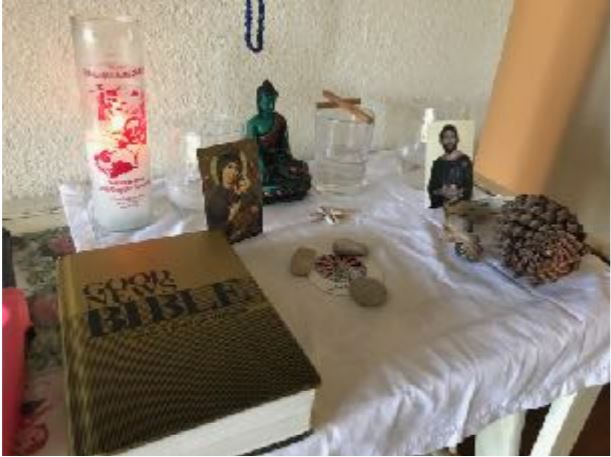Practices That Help Chaplains Embody Compassion: A Story and a Survey

by Michael Nilon, University of Virginia
They were a young couple, both with anguish in their eyes, both looking immensely tired in the room with the lavender trimming and white, thin hospital sheets. The couch was swathed in matching stale hospital sheets. The Saturday morning television programming was on in the background but neither father or mother watched it.
I happened to be on call that weekend, and the staff chaplain who I consider my supervisor had thought it wise to introduce me to these two parents of five-year-old boy and daughter who perished in the womb when I attended a training the day before. It was Saturday, and the phone call interrupted my weekend yoga practice.
I spent the moments driving to the hospital counting my breaths, and trying to allow my anxiety about missing something slip away as it came and went. When I arrived, the father held a small lump of flesh, very hard to see as a human being, but a human to these parents and so a human to me. I touched the body and felt her humanity in my heart.

After a few moments of quiet, I asked the parents what they needed me to do. The staff chaplain had visited with them at length yesterday, and between then and now they decided their child needed a baptism. “Can you please baptize her?” They wrote down her name on a sheet of paper, and I left to retrieve holy water from the chapel. I offered prayers for them in the chapel as tears came to my eyes: so much suffering in them. I returned, baptized the child, and offered prayers, which came from inside me as an anguished hope for healing in grief.
My conversation with God encouraged their anger and confusion and whatever else might arise for them. The mother wept in deep suffering, and her husband laid his head on her back suffering no less for its silence. There was such tenderness in their touch that I wanted to give them their privacy. I touched them both on the shoulders lightly but letting my hand stay for long moment, and I excused myself assuring them we would return if they needed us for anything else. I thought back to my morning offering after scanning the sensation in my body supine on the floor. I had felt cold after rolling out of bed. I lit a candle on my altar space with a white medicine candle, a Buddha, and two saint cards: Maria and Joseph. “May all beings be free of suffering and the sources of suffering. May all beings know happiness and the causes of happiness.”
My academic work will explore the practices that enable chaplains to be deeply present and closely attend to the painfulness and beauty in accompanying suffering. My desire is to know how clinical chaplains prepare themselves to engage in this work, which is also their greatest privilege. If you are interested in talking more, please fill out the survey below and email it to me.
I also welcome your stories. I hope you will contact me if you want to share your own stories of spiritual caregiving and contemplative practice.
Survey on Practices that Help Hospital Chaplains Embody Compassion
(copy the survey questions into an email or word doc and email your responses to Michael Nilon)
My research focuses on how hospital chaplains tinker with ways to cultivate their own compassionate presence. This type of presence is a resource for healing that patients in clinical settings seem to need. Recent scholars who have studied hospital chaplaincy have remarked on how it is a ministry of presence, but how do clinical chaplains embody presence and compassion? What kinds of prayer or other practices make it possible for chaplains to become a compassionate and healing presence for patients?
What is the central value or concept that informs your caregiving practice? For instance, it may not be compassion as I am suggesting. Can it be cultivated? How?
How do you typically prepare for visiting patients? Do you follow any particular routine?
What personal qualities or values are most important to chaplaincy? How do you cultivate those values or qualities?
Have you adopted specific forms of prayer or other spiritual disciplines to help you prepare for patient visits?
Do you meditate? What kind of meditation do you practice and where did you learn it?
Is there a person who serves as an ideal, role model, or exemplar that you attempt to follow in your practice of chaplaincy?
What have been the most important components of your training (either in clinical training or theological education) in equipping you to do clinical work?
Are there popular or well-researched forms of spiritual discipline that you have chosen not to practice? If so, why?
What is the name of your clinical setting? How many beds does it have? How many chaplains work in your spiritual care department? Is your clinical setting a training center for CPE? Where is your clinical setting located?
What is your ethnicity, faith group, gender, and age?
Would you be willing to take part in a research project that uses ethnographic methods (the exchange of stories and viewpoints) to explore how chaplains serve as healing and compassionate presences in hospital chaplaincy? If so what is your contact information and what are good times and methods to contact you?
* Please copy the survey questions into an email or word doc and email your responses to Michael Nilon.

